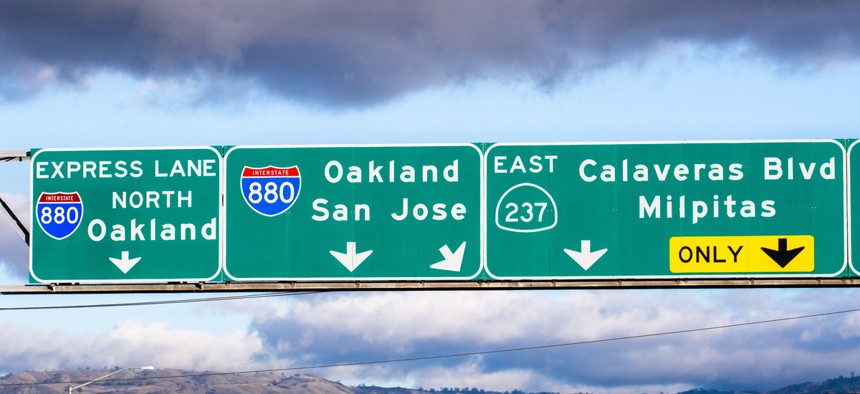Are State and Local Governments Prepared for the Next Recession?

Cities in California have a much more difficult time raising property taxes than other municipalities across the country, potentially making it more difficult to weather a downturn. Shutterstock

Connecting state and local government leaders
Two financial experts weigh in on state and local governments’ preparedness for the next recession.
Recessions are the inevitable result of fluctuations in the economy. Sometimes, they’re enormous, like the Great Recession that began in 2008, and sometimes, they’re relatively mild. But regardless of the size, fears are mounting over when the next recession will take place. In September 2019, the number of searches made about recessions on Google surpassed the level they hit in 2008, the previous peak in search queries about economic downturns.
While some indicators show that a recession may be on the horizon, predictions about when the next one will hit—and how big it will be—vary greatly. But even with the uncertainty about timing and size, many state and local governments have been preparing for years.
In an event last week at the Brookings Institution, a nonpartisan think tank, financial experts discussed state and local government readiness for the next recession and discussed which areas of the country might be most vulnerable during a downturned economy.
Laura Porter, the managing director for Fitch Ratings, a credit rating company, said that she believes “the vast majority” of state and local governments are prepared to manage their operations during a recession. “Not to say it's gonna be easy, but governments have been steadily bolstering their financial resilience throughout this extended recovery and we believe that they'll continue to adjust through anticipated challenges,” she said.
States have saved an impressive amount in the past few years. In fiscal year 2018, 32 states directed a combined $9.8 billion into their rainy day funds, and eight states’ rainy day funds could cover more days’ worth of spending than at any point since 2000. Wyoming currently has the largest rainy day fund relative to its operating costs, giving it the ability to run the government for 367 days without additional funding.
While many states are in a strong position to confront a loss of revenue, Mike Nadol, the former finance director for the city of Philadelphia and the current managing director of PFM Group, a financial services company, said that he worries that savings have made officials too comfortable. “Part of that is that we're now more than 10 years into what has become the longest expansion period in the US economy dating back to when … business cycle dynamics were first tracked, looking backward to the 1850s,” he said. “But as somebody who's lived through those cycles and what they mean in terms of service delivery and the difficult choices involved for state and local governments … it will come and it is important that governments are prepared.”
How prepared a government is for a recession is largely dependent on their revenue sources, both Nadol and Porter said. State revenues, which come mostly from income and sales taxes, drop quickly in downturns as people lose their jobs and become more cautious about their spending habits. When that happens, Porter said, states have three options. “You can increase revenues, you can cut spending, or you can use reserves,” she said. “States have a lot of control over revenue and spending, including the ability to download challenges to lower levels of government.”
When challenges at the state level get pushed to municipalities, local governments’ established tax structures may determine how well they can handle the increased load. Nadol pointed out that many Texas cities are reliant on property taxes for their general operating revenues, a source that is more resilient due to the timing of reassessment cycles. Local governments in California, by contrast, are severely limited in their abilities to raise property taxes, making them more sales tax reliant, and potentially more vulnerable.
As a result, California cities have some of the highest reserve balances of any in the country, Nadol said. Part of that is due to new taxes since the last recession, like those that some cities have placed on marijuana and real estate transfers. “If you kinda think about the local economy of the Bay Area in California and how high cost the real estate market is, Oakland actually generates a very material percentage of its overall revenues from the tax that you pay when you sell a property,” Nadol said. But that source could become more volatile during a recession if the city saw “a big slowdown in the number of transactions.”
Nadol and Porter both suggested that states make changes now, before a recession hits, to ensure that state and local governments are prepared. Nadol suggested states experiment with policies like sunsetting tax incentives that have “outlived their usefulness,” making strategic investments in municipal fleets to avoid costly repairs, and evaluating health care plans for government employees to ensure they can cover costs into the future.
“It's never easy to hold down spending, to hold down new service commitments, or increases you might want to give to hard-working public employees,” Nadol said. “But it's a lot easier and less disruptive to keep things in moderation through the better years of a business cycle rather than letting them become on-going commitments that might require layoffs or severe freezes or cuts when you hit that next difficult period.”
Emma Coleman is the assistant editor for Route Fifty.

NEXT STORY: Washington State May Give Seattle More Taxing Power





